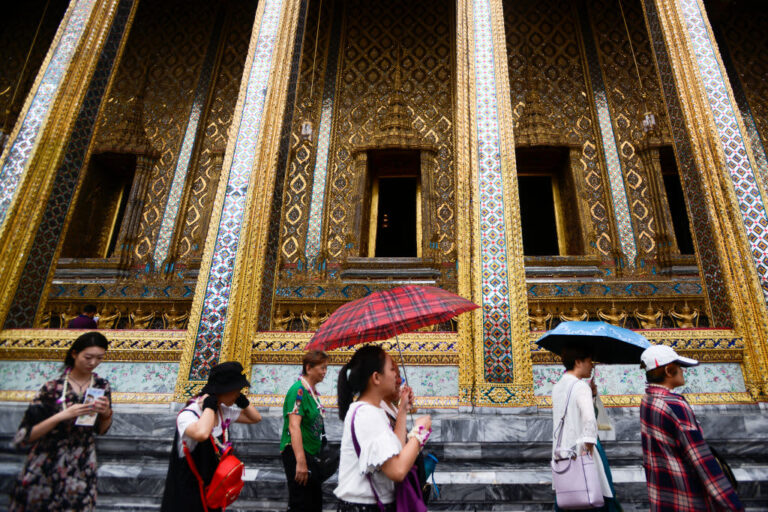Fewer Chinese tourists are visiting Thailand due to safety concerns, a new survey has found.
Anusak Raowiras | Noor Photo Getty Images
Japan and Thailand are two of the most popular tourist destinations in Asia.
But both countries are losing support among Chinese people as safety concerns grow among younger travelers.
The two countries were the most popular holiday destinations for Chinese tourists earlier this year, but Thailand dropped to sixth place and Japan to eighth in the third quarter, according to China Trading Desk, a marketing firm that measures Chinese travel sentiment quarterly.
Both countries are currently behind South Korea, Malaysia and Australia as the next holiday destinations for Chinese tourists, with Singapore, deemed one of the safest places for tourists in 2023, jumping into the top spot.
CNBC Travel has reached out to tourism authorities in Japan and Thailand for comment.
Subramanian Bhatt, CEO of China Trading Desk, the marketing firm that led the survey, said the release of radioactive wastewater from Japan’s Fukushima nuclear power plant into the Pacific Ocean in August had a major impact on Chinese sentiment towards traveling to Japan.
A survey of more than 10,000 Chinese citizens (94% of whom were under the age of 40) conducted by China Trading Desk found that good food was the top motivation for international travelers (23%), ahead of local history and culture (22%), nature (22%) and shopping (10%).
Although the World Health Organization and other safety groups have said seafood from Japan is safe to eat, fears among Chinese tourists have “turned one of the most popular travel destinations into one of the least popular,” Bhatt said.
Contrary to the trend of “set jetting,” in which movies and TV shows lure tourists to filming locations, several blockbuster films released this summer are deterring Chinese tourists from visiting Thailand.
Recent Chinese films “Lost in the Stars” and “No More Bets” are both works of fiction, and neither is set in Thailand, but some say their storylines bear strong parallels to real-life incidents that have made headlines in recent years, including the case of a Chinese woman who was pushed off a cliff in Thailand by her husband in 2019 (she broke 17 bones but survived).
This is especially true of “No More Bets,” the story of a young couple lured to Southeast Asia for new jobs only to find themselves trapped in a den of online fraud — a situation the United Nations estimates is like that of hundreds of thousands of people in the region.
Many of the facilities are located outside Thailand’s borders – in Cambodia, Laos and Myanmar – often in special economic zones where there is little rule of law, according to the UN. Victims come from Southeast and South Asia, mainland China, Taiwan and even Latin America.
Pia Oberoi, senior adviser on migration and human rights in the Asia-Pacific region at the Office of the United Nations High Commissioner for Human Rights, said the problem has grown since the COVID-19 pandemic, as border closures due to the spread of the virus have led to casino operators losing customers.
“Many of the facilities are being used by international crime groups as places where they defraud people, which means there are two sets of victims here – those who have been scammed, often out of large sums of money, and those who are forced to take part in these fraud operations in the centres across the Southeast Asia region,” she told Squawk Box Asia on Monday.
As well as fraud, the areas are said to be “lawless” zones where drug, wildlife and human trafficking is rampant.
“This is an incredibly lucrative business. It’s generating billions of dollars in profits,” Oberoi said.
While rumours about dangers to tourists have been circulating on Chinese social media, Oberoi said he had seen no evidence that tourists were “snatched off the streets and dragged to these centres”.
“The reality is that recruiting methods have become much more sophisticated,” she said, adding that job seekers are sometimes using recruiting platforms to give the impression they’re heading for a real job.
A man walks near a casino on the Myanmar-China border, a known hotbed of drug, wildlife and human trafficking.
Ye Aung Thu | AFP | Getty Images
She said governments have taken intervention measures, but more needs to be done to address persistent problems with corruption and enforcement of the rule of law in the region.
“There’s a roadmap being developed between ASEAN and the People’s Republic of China on a law enforcement response, but what we really want to focus on is, of course, the people who are caught up in it,” she told CNBC. “The violence and abuse perpetrated by people who are being forced to commit these crimes has reached horrific levels.”
According to Reuters, approximately 11 million Chinese tourists visited Thailand in 2019, making China Thailand’s largest sending market for inbound tourists.
Fewer than 2.5 million Chinese visitors had visited Thailand as of September, according to the Ministry of Tourism and Sports, well below the 5 million Thai authorities had expected this year.
As for whether the tourism industry can put economic pressure on governments, particularly in Southeast Asia, to do more, Oberoi said: “We are hopeful that the response to human rights violations will show the way forward. Governments will understand that their reputations depend on a comprehensive response.”
Cambodia has banned “No More Bets” from its cinemas, but as of early September it had grossed nearly $500 million in China.
“Some viewers of No More Bets were concerned that travelling to the region could be life-threatening,” said China Trading Desk’s Bhatt. “Over time, Southeast Asia has become increasingly associated with danger and what was once a popular international travel destination now has a negative connotation.”

